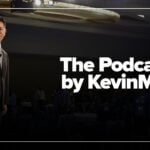I used to whisper it into the dark, lying awake, watching the clock creep past 2 a.m. My body was exhausted, but my mind refused to stop sprinting, running a veritable marathon most of the night. When the sun finally pushed through the curtains, it didn’t feel like morning. It felt like failure, another day to muscle through on fumes.
Sometimes that was the hardest moment of the day. Little sleep left me ill-prepared to attack another shift, and I could feel the weight of dread pressing on my chest. If you’ve never experienced it, dread is not light.
I told myself, “I’m fine.” Determination had gotten me everything else: the degree, board certification in emergency medicine, the six-figure income, the house, the cars. Surely it could fix this too.
Just work harder. Push through. Be stronger. That mindset cost me more than I ever imagined: two marriages, a battle with opioid addiction, and years that should have been filled with joy and purpose.
I paid an extraordinary price like so many professionals do. In truth, it almost cost me my life.
Impacting the things that mattered the most
I can now see how my depression contributed to the demise of my first two marriages. It’s hard to show up well for your spouse when you don’t feel good about yourself.
In 2020, five years into my current marriage, I felt it happening again. My world was getting smaller. I was less engaged with my wife, more distant with my boys. My burnout in the emergency department hit a critical mass.
I hid in naps, convincing myself I just needed rest, but what I really needed was relief from myself.
Shame crept in. Not performing at 100 percent felt like weakness. So, I stayed silent.
Sometimes that silence came out as irritability. Were my kids really out of control and deserving of the booming “Dad voice”? Or were they just being kids? It was hard to see clearly.
Other times the silence showed up as withdrawal. I just need a nap. If I could just stop existing for an hour or two, maybe I’d feel better.
Work was becoming more difficult
For nearly two decades, I thrived in chaos. Four ambulances in 25 minutes? No problem. I wore that pace like a badge of honor.
But something changed.
The same shifts that used to energize me now filled me with dread days in advance. I started questioning whether I could keep doing the work I once loved.
My empathy faded. My patience thinned. I hoped I still looked compassionate on the outside, even when I felt nothing inside.
How I got healthy again
My wife noticed before I did. “Maybe you should go back on your antidepressant,” she said gently.
I did. But the spark never came back. Like half of all patients, I didn’t respond much to the medication. The truth is, these meds do not get to the root cause of the depression, which I learned isn’t so much a serotonin deficiency as it is a loss of neuroplasticity due to chronic stress.
Counseling in the past had helped me process, but it didn’t lift the weight. I didn’t even try it this time. I felt defeated, wondering if this was just who I was. Would I always struggle like my dad had, trying to manage the gray.
Then I learned about IV ketamine therapy.
A medicine I thought I already knew
I’d used ketamine for years in the ER for years to sedate children for painful procedures. I knew it as a safe anesthetic, not a treatment for depression.
Then I read the research.
Since 2000, studies have shown its profound impact on suicidal thoughts.
Unlike SSRIs, ketamine targets the brain itself: the neural pathways, not just the neurotransmitters.
Chronic stress strips away connections in the brain. It’s like having too many cars and not enough lanes; traffic everywhere, communication nowhere. Ketamine helps rebuild those lanes. It helps the brain reconnect.
Healing started after just one treatment
After my first infusion, I told my wife, “I want everyone to do that.”
For the first time in years, my mind was quiet. I felt peace. I felt empathy.
When I returned to the ER, the work was still demanding, but it no longer grated my soul. I could roll with adversity with calm and clarity. I had resiliency in the suck.
Today, IV ketamine therapy, which works more effectively than other routes like intranasal or oral, is the reason my depression is in remission. I don’t take antidepressants. I don’t struggle with my mood. Even the hard days are not overlaid with gray, and, when they do occur it’s just for a day. That’s just life, and I’m good with that!
IV ketamine gave me back the life I nearly lost. And it gave me the ability to finally mean it when I say, “I’m fine.”
Dee Bonney is a board-certified emergency medicine physician and co-founder of AlphaOmega Wellness in Greenwood, Indiana. With over twenty years of clinical experience, he brings a compassionate and evidence-based approach to integrative mental health care. After achieving remission from lifelong depression through IV ketamine therapy, Dr. Bonney redirected his medical focus toward addressing the root causes of mental illness. At AlphaOmega Wellness, he and his team combine medical science, spiritual wellness, and innovative treatments like ketamine infusion therapy to foster lasting transformation.
Dr. Bonney completed the Certificate in Psychedelic-Assisted Therapies and Research at the California Institute of Integral Studies. His thought leadership extends to published reflections on patient care and the human condition, featured in KevinMD. He also engages the public through Facebook, Instagram, LinkedIn, and TikTok.






















![AI censorship threatens the lifeline of caregiver support [PODCAST]](https://kevinmd.com/wp-content/uploads/Design-2-190x100.jpg)
